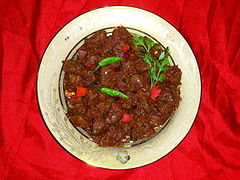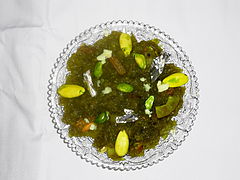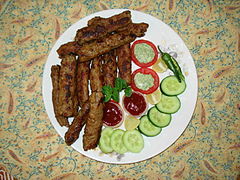Cuisine of Karachi
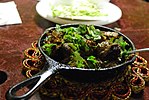 |
| This article is part of the series |
| Pakistani cuisine پاکستانی پکوان |
|---|
|
Karachi cuisine (Urdu: کراچی پکوان) refers to the food found mainly in the city of Karachi, Sindh, Pakistan. It is a multicultural cuisine as a result of the city consisting of various ethnic groups from different parts of Pakistan.[1] Karachi is considered the melting pot of Pakistan.[2]
The cuisine of Karachi is strongly influenced by the city's Muhajir population, who came from various parts of India and settled primarily in Karachi after the independence of Pakistan in 1947. Most Urdu speaking Muslims have traditionally been based in Karachi, hence the city is known for Muhajir tastes in its cuisine. North Indian Muslims maintained their old established culinary traditions, including variety of dishes and beverages.
The Mughal, Awadhi, and Hyderabadi cuisine played an influential role in the making of their cuisine, having taste vary from mild to spicy and is often associated with aroma. In comparison to other Pakistani dishes, Muhajir cuisine tends to use stronger spices and flavors. Most of a dastarkhawan dining table include chapatti, rice, dal, vegetable and meat curry. Special dishes include biryani, Pulao, qorma, Paya, kofta, seekh kabab, Nihari, Haleem, Nargisi Koftay, Kata-Kat, Rogani Naan, Naan, sheer-qurma (sweet), chai (sweet, milky tea), and paan.
North Indian cuisine is renowned for its cultural fusion, due to various empires and peoples occupying this region. As a result, Bengali cuisine, Gujarati cuisine, Bihari cuisine, Uttar Pradeshi cuisine and Muslim Hyderabadi cuisine collaboratively had an influence on the style of Muhajir food. The Pakistani cuisines such as Sindhi cuisine, Punjabi cuisine, Pashtun cuisine, Kalash cuisine, Saraiki cuisine, Kashmiri cuisine, Balochi cuisine, and other regional cuisines have also influenced the cuisine of Karachi.
Historical influences[]
The arrival of Islam within the Indian subcontinent influenced the local cuisine to a great degree. The influence of the Central Asian, South Asian and Middle Eastern cuisine in Pakistani food is ubiquitous. Since Muslims are forbidden to eat pork or consume alcohol and the Halal dietary guidelines are strictly observed, Pakistanis focus on other areas of food such as beef, lamb, chicken, fish, and vegetables as well as traditional fruit and dairy.
Dishes[]
- Aloo (potato) cholay (peas)
- Aloo (potato) chaat
- Aloo (potato) paratha (Urdu: آلو پراٹھا)
- Anda (egg) paratha
- Bakarkhani or Baqerkhani
- Bihari kebab
- Bun kebab
- Chargha
- Chicken karahi
- Chicken tikka
- Dalcha (also called Dal gosht)
- Double ka meetha (also called Shahi tukra)
- Falooda (Urdu: فالودہ)
- Firni
- Gajar ka halwa
- Gobhi (cauliflower) paratha
- Golgappa (also called Panipuri)
- Haleem
- Halwa poori
- Hyderabadi biryani (Urdu: حیدرآبادی بریانی)
- Jalebi
- Kachori
- Kadhi or karhi (Urdu: کڑھی)
- Kata-kat
- Kheer
- Kofta (Urdu:كوفته)
- Kulcha (Urdu: کلچه)
- Lukhmi (Urdu: لقمی)
- Namak para
- Nargisi kofta
- Nihari, a popular national dish in Pakistan, was originally brought by Muhajirs (immigrants) from Delhi, India.
- Paan (Urdu: پان), a traditional Muhajir betel leaf stimulant
- Pakora (Urdu: پکوڑا)
- Pasanda(Urdu: پسندے)
- Pulao (Urdu: پلاؤ)
- Qorma (Urdu: قورمه)
- Rabri
- Raita
- Ras malai[3]
- Sajji
- Samosa
- Seekh kebab
- Shami kebab
- Shawarma
- Sheer korma or Sheer khurma
- Sheermal or Shirmal (Urdu: شیرمال)
- Siri paya
- Taftan (Urdu: تافتان)
This section contains embedded lists that may be poorly defined, unverified or indiscriminate. (July 2021) |
- Ajwain Paratha
- Anday wala Burger (Egg Burger)
- Chana Chaat
- Boti Kebab
- Channa Dal paratha
- Dahi Baray
- Dhaniya Paratha
- Fry Kebab
- Galawati Kebab
- Gil e firdaus
- Gola Kebab
- Habshi Halwa
- Kache Qeema Kebab
- Kaleji (liver) Kabab
- Kebab roll
- Lamb karahi
- Lamb Tikka
- Lauki ka Paratha
- Lauki Ka Halwa
- Mashed dal Paratha
- Mattar (peas) Paratha
- Methi (fenugreek leaves) wala Paratha
- Mooli (Reddish ) Paratha
- Murgh -e- Musallam
- Pyaz (onion) ka Paratha
- Qeema Naan
- Qeema Paratha
- Reshmi Kebab
- Rizala
- Rumali Roti (Urdu: رومالی روٹی)
- Shab Daig
- Sultani Dal
- Tandoori Paratha
- Tahihri (rice colored yellow with potato)
- Warqui (layered) Paratha
- Zamin Doz Macchli (fish stuffed with spices and sealed in earthenware case which is then cooked for 8 hours)
Gallery[]
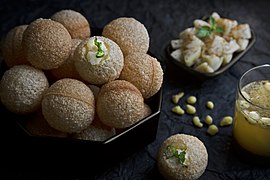
Golgappa/Panipuri

Haleem served with garnish

Halwa poori
Kofta/Nargisi kofta
Qorma
Siri paya
Bihari Kebab
Chargah
Dahi Baray
Gajer Ka Halwa
Gobhi Paratha with Yoghurt
Gola Kebab
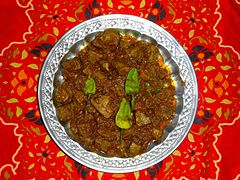
Kaleji (liver) Kabab
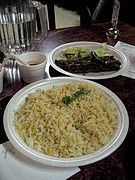
Lamb Tikka with Plain Rice
Lauki Ka Halwa
Pasanday
Reshmi Kebab
Shab Daig
Seekh Kabab
Shahi Tukray
See also[]
- Mughlai cuisine
- Pakistani cuisine
- Sindhi cuisine
- Punjabi cuisine
- Pashtun cuisine
- Kalash cuisine
- Saraiki cuisine
- Kashmiri cuisine
- Balochi cuisine
- North Indian cuisine
- Hyderabadi cuisine
- Karachi Bakery, a bakery chain in India
| Wikimedia Commons has media related to Cuisine of Karachi. |
References[]
- ^ "11 Dishes to Eat When You're in Karachi, Pakistan". Noreen Gulwani. Culture Trip.
- ^ Miandad, Muhammad, et al. "Educational status and awareness among tuberculosis patients of Karachi." J Pak Med Assoc 66.3 (2016): 265-9.
- ^ "Chefs Table: Fine Dining Goes Desi". Food Tribune.
- Cuisine of Karachi
- Muhajir cuisine
- Muhajir history
- Pakistani cuisine













